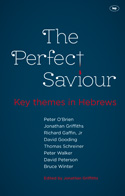
Jonathan Griffiths, Ed.
Reviewed by: Donald M. Poundstone
The Perfect Saviour: Key Themes in Hebrews, edited by Jonathan Griffiths. Published by Inter-Varsity Press (England), 2012. Paperback, 176 pages, currently $6.31 plus shipping at Amazon. Reviewed by retired OP minister Donald M. Poundstone.
One of my seminary professors observed that pastors often avoid preaching on the book of Hebrews because Christians don't know much about the book of Leviticus. On the other hand, a popular Reformed teacher says that if he had to be stranded on a desert island with only one book of the Bible, it would be Hebrews.
Such is the difficulty that this meaty volume of eight essays by biblical scholars from England, Northern Ireland, Australia, and America seeks to address. (Most readers of New Horizons will recognize among the contributors only the name of retired OP professor Richard Gaffin, Jr.) How can Christians with a weak knowledge of Old Testament religious rituals make sense of an epistle that presumes intimate acquaintance with such ceremonies?
The Perfect Saviour aims to "bridge the gap between the work of evangelical scholars in universities and colleges and the world of the busy preacher and Bible teacher." Topics covered are the new covenant, the word of God, the priesthood of Christ, the tabernacle, warning and assurance, access and arrival, perfection, and suffering.
The authors perform a valuable service by faithfully summarizing the teaching of the epistle on these central themes. While intended primarily for ministers, the articles are accessible to all serious readers of the Bible. The book lends itself to careful study and discussion by small groups of believers, and will engage the interest and prove edifying to adult Christians.
Its usefulness to "the busy preacher" is another matter. Perhaps it could serve as an introduction or refresher course before he starts a sermon series on Hebrews. Pastors with a solid theological education, however, should be able to mine any of several full-length commentaries to aid their understanding of particular texts and topics in Hebrews.
Thoughtful essays such as these provoke the reader's thinking on related matters. For example, the writers agree that Hebrews is a sermon or "oral communication" rather than a typical epistle or letter. (Just compare the opening verses of Hebrews with those in the acknowledged "letters" of Paul and Peter.) If they are right, how should that affect our practice and attitudes toward writing out sermons in full, reading them before a congregation at worship, and then making copies for later use or distribution? If a Bible writer does all this, can we object if modern preachers follow in his steps?
Another thought. Hebrews makes much of the imperfect, temporary, and anticipatory nature of Jewish rituals versus the supremacy of Christ and the finality of God's new covenant. That's why we no longer slaughter animals in church or follow ancient rules about clean and unclean foods. Do these considerable differences between the old and new covenants take us further? Is it perhaps possible that some of the songs and prayers used by Jews before the coming of Christ have now grown "obsolete" (Heb. 8:13)?
I recommend The Perfect Saviour to believers who desire a deeper appreciation of the Epistle to the Hebrews.
March 30, 2025
On the Trail with a Missionary
March 23, 2025
Midnight Mercies: Walking with God Through Depression in Motherhood
March 16, 2025
March 09, 2025
Zwingli the Pastor: A Life in Conflict
March 02, 2025
February 23, 2025
African Heroes: Discovering Our Christian Heritage
February 16, 2025
© 2025 The Orthodox Presbyterian Church